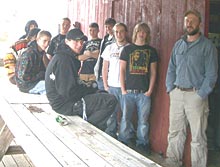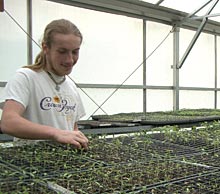It’s not your typical horticulture training program. Although the farming curriculum is accredited by the state, the students at the Youth Fresh Food Initiative don’t spend their class time inside, listening to lectures and taking notes. Instead, they’re outside in the garden, hard at work in a thriving agricultural enterprise.

Students at the Buncombe Community School East in Swannanoa contribute not only daily labor but also farm and business planning, facility design, contact with customers, and follow-through on production contracts.
It hasn’t always been this way. When Program Director Casey McKissick arrived at the school in 2002, farming was an elective course without substantial curriculum or funding. And while McKissick says the training was beneficial and successful, its impact was limited. “It was mostly a chance for the kids to get out of the classroom, get outside, get their hands in the dirt and let some energy out,” he explains. “But I saw a real need for something more.”
Together with an intern from nearby Warren Wilson College, McKissick wrote a curriculum for three comprehensive agriculture-training courses and obtained county, state and federal funding to help expand the garden. Each semester, he leads 20 students in work on an organically run, full-production farm that involves them in every aspect of production and keeps them on track toward graduation.
This experiential, action-oriented approach—which is closely akin to Warren Wilson’s work/service/learning approach—is especially appropriate for the Buncombe Community School. The alternative serves students who leave either county or Asheville City schools due to extensive disciplinary problems or other difficulties in a traditional high-school setting.
The school follows Outward Bound’s “expeditionary learning” model, which emphasizes hands-on experience, cooperative responsibility and the use of classroom knowledge to solve important and relevant problems.
“Our school has smaller classes, but that’s not what makes us different,” says BCS Principal Kathy Noyes. “We involve our students in expeditionary, hands-on education that integrates knowledge with application and action.”
The Youth Fresh Food Initiative showcases both the school’s educational philosophy and its positive outcomes. Students are encouraged to take direct responsibility for the care of the farm. They keep the seeding and planting schedule on track; they cultivate crops in the hoop house and harvest them when they’re ready; they drive the tractor that prepares field beds for planting; they speak with customers about heirloom vegetables at the on-site farm stand and the Black Mountain tailgate market. Students even built the on-campus barn that houses equipment, including the tractor.

The result, says McKissick, is a cooperative learning and working environment where students come to know and respect one another, learn the rewards of responsibility, and produce quality work they can be proud of. “Kids in the program,” he notes, “become employees or stewards in an existing business that has been built by the blood and sweat of students that came before them. They come to see that they have a big responsibility to carry the torch, so to speak.”
Besides selling vegetables and plant starts at the on-campus farm stand, students sell their produce at the weekly tailgate market in Black Mountain and at the Herb Festival at the WNC Farmers Market every May. The program regularly sells plant starts to the garden center at the Swannanoa Ingles and has an ongoing contract to provide lettuce to Biltmore Estate’s restaurants.
And of course, they also get to eat and enjoy their own produce. Last fall, the students raised a flock of chickens for meat. The chicks arrived at the school one day after hatching, and from that first day all the way up to—and including—the slaughter, students were responsible for caring for the hens.
“It was a whole lot of work,” Colton Ellingwood says with a laugh. “We had to feed them three times a day, water them, move them around the fields, repair the electric fence [for predator control]—it’s just everything.” At the end of the semester, the students took their flock over to Warren Wilson College, slaughtered and dressed the birds, and then prepared and enjoyed a celebratory meal (including chicken, of course) with Warren Wilson students.
“The students that were out there on slaughter day, doing that work together, they’ll never forget that for the rest of their lives,” McKissick recalls.
Aside from crop production and gaining business and agricultural knowledge, McKissick’s biggest goal for the program is to keep students motivated in school. “Kids will sometimes tell me that they come to school just because they look forward to this class,” says McKissick. “What this program is able to do is keep kids engaged—and maybe it’s keeping them in school, too.”
Look for Casey McKissick and YFFI students at their booth at the WNC Herb Festival at the WNC Farmers Market Friday through Sunday, May 2 to 4.
[Asheville resident Ginger Kowal is a UNCA senior majoring in biology.]



Before you comment
The comments section is here to provide a platform for civil dialogue on the issues we face together as a local community. Xpress is committed to offering this platform for all voices, but when the tone of the discussion gets nasty or strays off topic, we believe many people choose not to participate. Xpress editors are determined to moderate comments to ensure a constructive interchange is maintained. All comments judged not to be in keeping with the spirit of civil discourse will be removed and repeat violators will be banned. See here for our terms of service. Thank you for being part of this effort to promote respectful discussion.